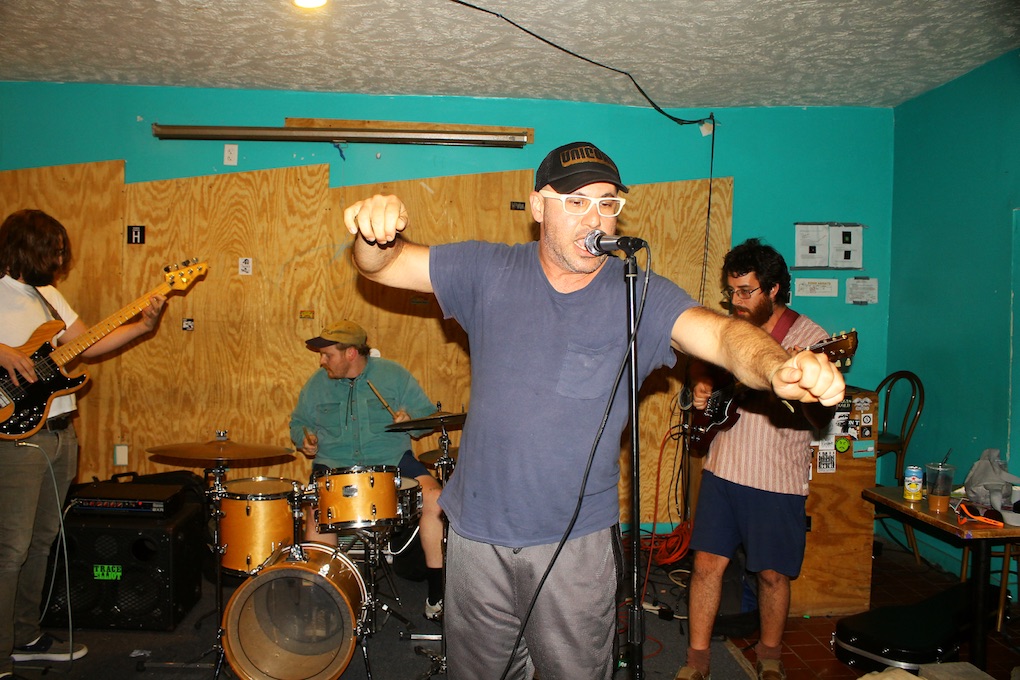
Underappreciated Album: Pell Mell – Interstate
There are some records that just are made to be played out of car speakers. Call them road songs. Call them travel soundtracks. Call them odes to interstates. They just sound right when spilling out from the cracked windows of a car cruising 65 mph down some nameless stretch of asphalt, painted stripes and mile markers.
In the mid-1990s, Pell Mell knew this about its blend of instrumental rock all too well and crafted its1995 DGC Records outing with full-blown homage to the niche-genre. From the record’s very name and occasional track listings (“Blacktop”) to the CD packaging (lots of blurred motion, passenger-seat shots of treetops and mountain ranges), Interstate was made for the road. There may be few records from the 1990s that sound better as you consciously sink your foot into the clutch or flash a glance at your driver’s side mirror.
Interstate spans 12 tracks and even more passing landscapes, and it has good moments and great moments. But there are a few tracks that are just incredible and they are, for the record and in order of appearance, “Nothing Lies Still Long,” “Saucer,” “Drift” and “Vegetable Kingdom.”
“Nothing Lies Still Long” isn’t an album-opening highlight as much as it’s a declaration of intent. Here, we have the entirety of Interstate laid out before us: the steady, even-handed climb of percussion and bass, the glassy guitars setting the pace as well as pulling the listener above and beyond it, the carefully mapped sound, the bridges building upon bridges building upon bridges. The fact that the four-minute track ends with the same basic bass-and-guitar scale that initiates it is testament to the record’s sense of scope but also to its pseudo-theme: Pell Mell are taking us on a journey of sorts, but the foundation of that journey — the vehicle, or instrument, or what have you — remains largely constant and fixed. Hey, when you trek cross country, the impressions in the driver’s seat may change, but the seat itself remains.
“Saucer, ” in contrast, is Pell Mell in more aggressive — though far, far, far from uncontrolled — form. The track depends on the same bass-and-drum consistency of “Nothing Lies Still Long:” but adds a sense of force that the original track lacks. It’s a track like this, and the straight-faced but playful interplay of its key instrumental elements, that arguably sets the stage for records like Trans Am’s self-titled Thrill Jockey debut or Phono Comb’s Fresh Gasoline.
It’s “Drift” and “Vegetable Kingdom,” though, that are the record’s most exceptional stand-outs. The tracks work best taken as a complementary pair — with the dreamy “Drift” as an introduction to the cut-and-paste verse/chorus/verse inversions of “Vegetable Kingdom” — but, even on their own, they feel intensely enveloping and definitive. “Drift” is best described by its own title, a delicate slice of math-rock with its head floating through the clouds. The listener follows a hushed (but hand-picked) repetition on electric guitar as it’s gradually supplemented by spacey keyboards, spare percussion and the occasional, lingering heart-beat of bass. Then, out of nowhere, the lead guitar enters — a strung-out, slightly reverb-tinged solo where each note carries with it a great deal of weight and narration — and the song takes greater form. The percussion and bass become more pronounced, as drummer Robert Beerman taps and clacks the edge of his snare, pianist/noisemaker Steve Fisk adds atmosphere, and bassist Greg Freeman slinks around the background. But the real star is David Spalding, whose lead guitar continues to plot the course until that hushed guitar line envelopes it again in the end.
“Vegetable Kingdom” could make Brian McMahan and David Pajo proud of the beast they birthed with Spiderland just a few years before this. As Fisk loops and distorts a sample, Beerman, Freeman and Spalding build the sound around a series of crescendos that manage to build intensity through repetitions and without resorting to the clumsy roar of a distortion pedal. The song gets more and more tightly wound as it moves along, the math-rock guitar lines interweaving with bass as they build into bridges and then drop back, giving back to various interludes — a few bars of kick-drum-heavy and plodding percussion, a Surfaris-style bend before a repeating guitar measure, the crystalline guitar Spalding places over at least two or three tenderly multi-tracked patterns, the incredible acoustic-guitar breakdown that feeds right into a full-band refrain, complete with Fisk’s organ-grinding.
This is what we call texture.
Elsewhere on the CD, Pell Mell retains this densely patterned quality, if only with slightly less ambition. Tracks like “Revival” and “Pound Cake” are well-written, well-performed and well-recorded but, after years of hearing driving, instrumental rock like this in the background of movies and, yes, car commercials, it sounds less groundbreaking than some of what surrounds it. Pell Mell tries its hand at pensive but band-oriented shoe-gazing (“Anna Karina,” “Butterfly Effect”), cinematic reprises (the Western credit sequences in “Constellation,” the walking-home-alone resolve of “Ether”), and catchy instrumental rock (“Blacktop,” the album-closing “Floating Gate”), all with equal success.
But, all in all, the record is best digested when in motion and when on wheels.
Without words, the tracks adopt their own meanings, infer and imply their own narratives, leave the listener filling in the blanks about intent and perceived resolutions and conflicts. It’s a lot like a good drive when you don’t have a destination, when you’re wandering for the sake of wandering, when you’re taking to the road just because you want to get lost somewhere other than right here. Everything around you takes on a different quality and you begin to notice details that you once may not have even given a passing glance. As the odometer rolls along or you stub out another cigarette in that tucked-away dashboard ashtray, the scenery, if you give it the chance, begins to reflect what’s percolating between your ears.
Pell Mell seemed to nail these themes without much struggle back in 1995 and the quartet’s little 12-track, 50-minute instrumental lullaby to the world’s highways is even better than high-octane/high-priced gasoline when it comes to fueling that hunger for the open road.



